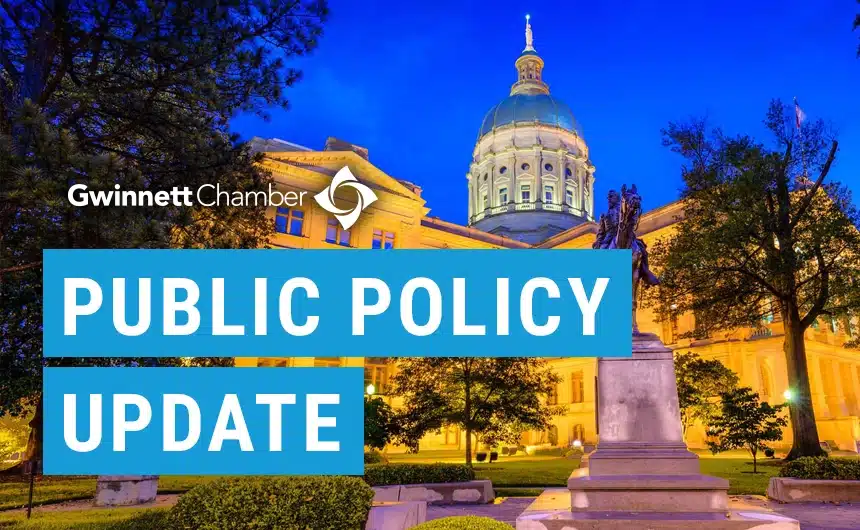This week, lawmakers met for legislative days 19 – 22. Speaker Jon Burns appointed State Representative Robert Parrish of Swainsboro to serve as the next Rules Committee Chairman. Chairman Parrish succeeds the late Richard Smith after his tragic recent passing. Chairman Parrish has served in the General Assembly since 1984. He has ties to the Swainsboro/Emanuel County Chamber of Commerce having served as Past President. The Rules Committee decides which bills are considered for a vote by the full House.
Next week, legislators will convene for legislative days 23-25.
Bills to Watch
HB 282 by State Representative Mesha Mainor (HD 56) would remove barriers for school districts to access and utilize soft skills career readiness curriculum training in their schools. The bill passed the House 165-0 on Thursday.
HB 926 by State Rep. Matt Reeves would allow an individual with a felony record to request a “certificate of good standing” from the Board of Corrections or the Board of Community Supervision for employers to consider in the hiring process. This bill, known as the Second Chance Workforce Act, would not hide criminal records but provide further context to an individual’s circumstances. It is assigned to House Judiciary Non-Civil Committee.
HB 946 sponsored by State Rep. Lee Hawkins (HD 27) and SB 383 by State Senator Shelly Echols (SD 49) would change the provisions for the calling of a T-SPLOST. Currently, all qualified cities within a county are required to enter into the intergovernmental agreement. This bill would allow cities representing more than 50% of the county municipal population to enter into an agreement. If all cities sign the agreement, the maximum amount of years levied may be extended to 6 years. The House Ways and Means Committee favorably reported HB 946 by substitute last week.
HB 982 by State Representative Matthew Gambill (HD 15), one of Governor Kemp’s Floor Leaders, would require the State Workforce Development Board to publish a High-Demand Career List most critical to the state’s current and future workforce needs. The bill has been assigned to the Senate Higher Education Committee. The House passed the measure 161-1.
HB 1015 by State Rep. Lauren McDonald (HD 26) would reduce the state income tax from 5.57% to 5.39%, saving Georgia taxpayers roughly $1 billion. The bill has been assigned to the Senate Finance Committee. The House passed the bill unanimously.
HB 1019 by State Rep. Matt Reeves (HD 99) would increase the Georgia homestead exemption from $2,000 to $4,000. The bill passed the House 162-0. The bill has been assigned to the Senate Finance Committee.
HB 1033 by State Rep. Rob Leverett (HD 123) would add protections for utility workers, including subcontractors, by enhancing penalties for anyone threatening or injuring them. The House passed the bill unanimously 161-0 on Monday.
HB 1124 by State Representative Chuck Martin (HD 49) would change lower the credit requirements of students to be eligible for needs based financial aid. The House Higher Education Committee favorably reported.
HB 1172 by House Majority Caucus Whip James Burchett (HD 176) removes references to the public trust doctrine as it relates to water rights in SB 115 that passed in 2023.
HB 1180 by State Representative Kasey Carpenter (HD 4) would change the tax credit qualification requirements for film companies and add limits to the selling of credits. Rep. Carpenter is the Chairman of the House Creative Arts and Entertainment Committee. The bill has been assigned to the House Ways and Means Committee.
HB 1181 by State Representative Chuck Martin (HD 49) would limit the carry-forward period for a number of tax credits. The bill was introduced this week and is assigned to the House Ways and Means Committee.
HB 1192 by State Representative John Carson (HD 46) would suspend the issuance of new certificates of sales and use tax exemption on high-tech data center equipment. The bill has been assigned to the House Ways and Means Committee.
SB 293 by State Senator Ben Watson (SD 1) would change the way county public health boards appoint district health directors. Currently, the county board of health appoints its director. This bill would have the state’s Public Health Commissioner appoint district health directors. Senate Health and Human Services Committee favorably reported by substitute.
SB 333 by State Senator Clint Dixon would add a Mulberry cityhood question on the May 2024 ballot. The Governor signed the bill on Tuesday.
SB 362 by State Senator Mike Hodges (SD 3) would require businesses to hold secret ballot elections for organizing unions in order to be eligible to receive certain tax incentives from the state. The bill passed in the Senate 31-23. This is one of Governor Kemp’s priorities.
SB 366 “Tax Expenditures Transparency Act of 2024” by State Senator Chuck Hufstetler (SD 52) would create the Joint Committee on Taxation and Economic Development to review the economic impact of tax credits and exemptions subject to analysis the prior year. On Tuesday, the bill passed by substitute 50-0 in the Senate. It has been assigned to the House Ways and Means Committee.
SB 386 by State Senator Clint Dixon (SD 45) would put sports betting under the Georgia Lottery, avoiding the need to pass on a two thirds majority and constitutional amendment. State Senator Bill Cowsert (SD 46) proposed an amendment that would require a constitutional amendment. The Senate passed the measure with Cowsert’s amendment 35-16. The bill has been assigned to the House Higher Education Committee.
SB 420 by State Senator Jason Anavitarte (SD 31) would prohibit the acquisition of certain land by certain foreign persons and entities connected with foreign adversaries identified by the U.S. Secretary of Commerce. It has been assigned to the Senate Committee on Regulated Industries and Utilities.
SB 426 by State Senator Blake Tillery (SD 19) would limit how insurance companies can be sued in accidents with big trucks. The bill passed in the Senate 46-2 on Tuesday and was first read in the House on Thursday.
SB 429 by State Senator Greg Dolezal (SD 27) would allow lawmakers to evaluate pending legislation and rules that could impact small businesses. It also changes the definition of “small business” by raising the employee count from 100 to 300. Senate Regulated Industries and Utilities favorably reported on Thursday.
SB 430 by State Senator Greg Dolezal would keep the COVID-19 liability protections in place for businesses but no longer require them to have a written warning of COVID-19 risk displayed. The Senate passed the bill unanimously 47-0 on Thursday.
SB 435 by State Senator Frank Ginn (SD 47) would establish community development districts that serve to finance, construct, acquire, operate, and maintain public infrastructure, requires approval from the local government in which the development is located, and would be Governed by a five-member elected board. It has been assigned to the Senate Regulated Industries and Utilities Committee.





